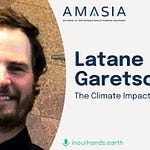In this episode, Ramanan speaks with Gernot Wagner, a climate economist at Columbia Business School. They discuss geoengineering, lifestyle changes, and messaging about climate action.
Wagner has written four books: Geoengineering: the Gamble, Stadt, Land, Klima, Climate Shock, and But will the planet notice? His most recent book provides a balanced take on the possible benefits and risks of geoengineering in its various forms. Prior to joining Columbia as senior lecturer, Gernot taught at NYU, Harvard, and Columbia.
He was the founding executive director of Harvard’s Solar Geoengineering Research Program, and served as economist at the Environmental Defense Fund. He has been a term member of the Council on Foreign Relations, is a Senior Fellow at the Jain Family Institute and is on the board of CarbonPlan.org.
Full transcript above. This episode is also available on Apple Podcasts and Spotify.
In Our Hands is a production of Amasia. Follow these links for more about our firm, the Amasia blog, our climate fiction podcast, and Ramanan’s blog.
Highlights
[00:08:16] Private Sector Geoengineering
[00:11:28] Individual Lifestyle Change












